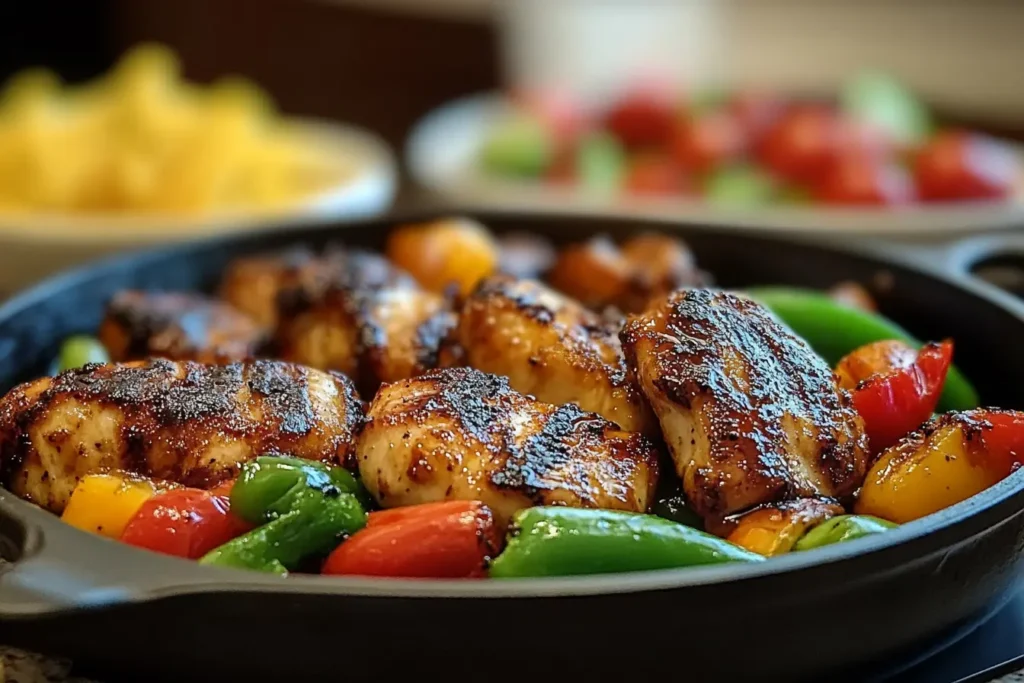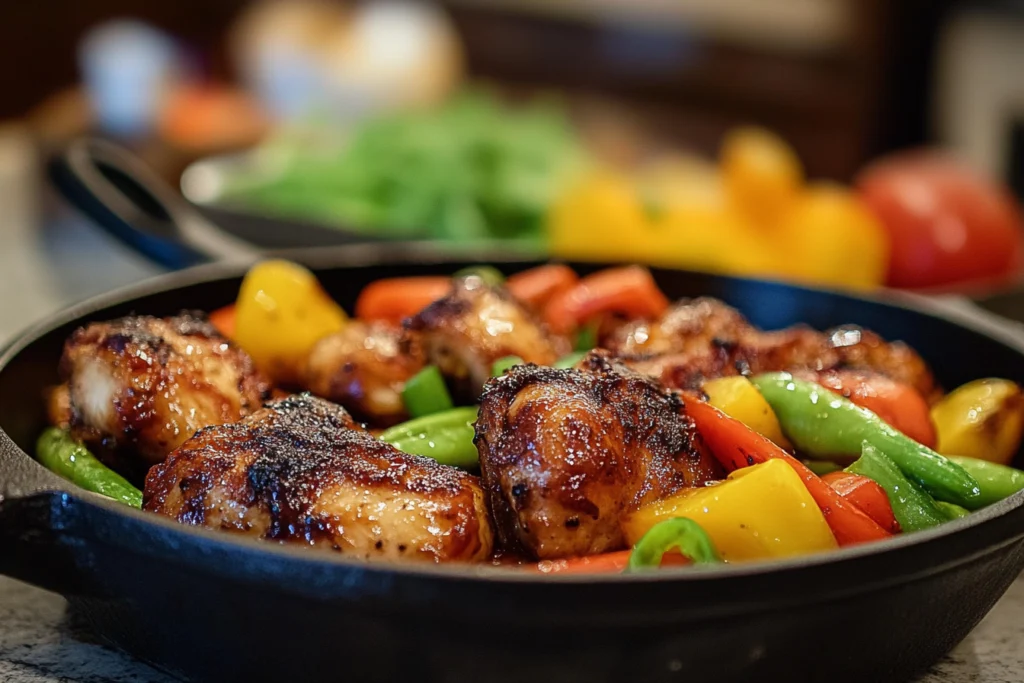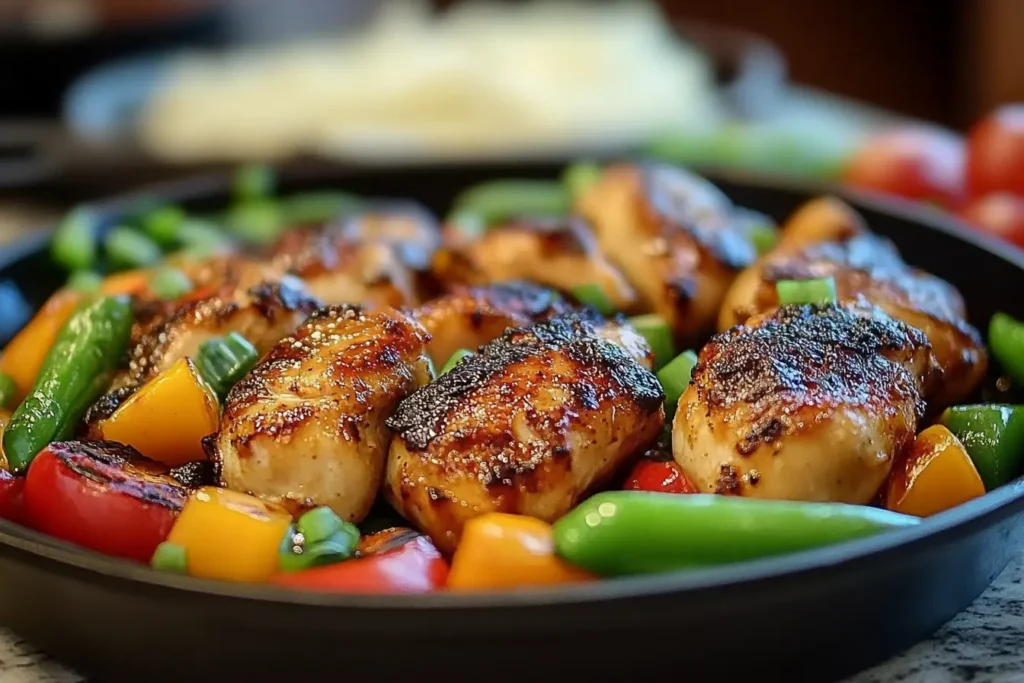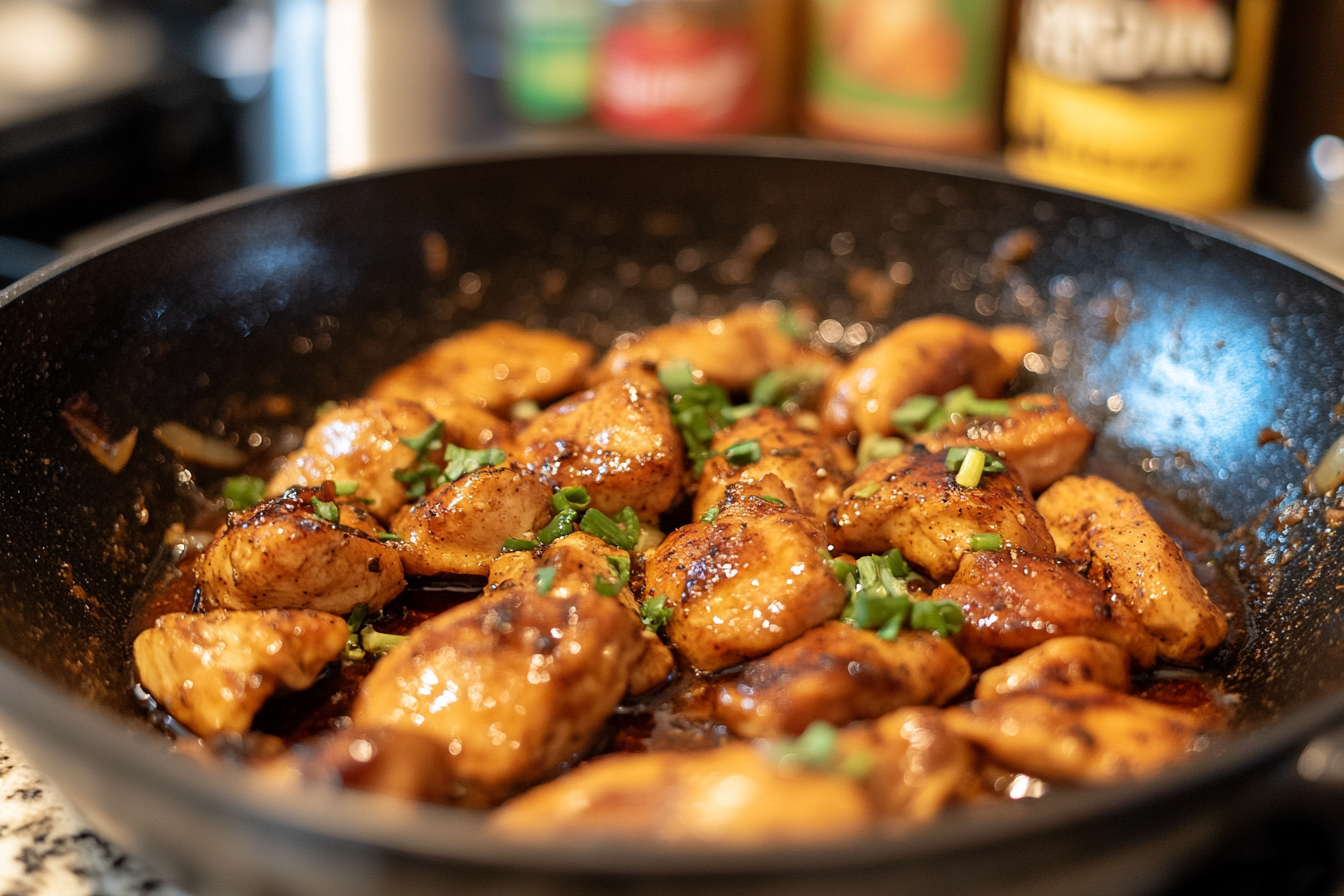This article is designed to guide you through the art of crafting the ultimate Asian chicken marinade with recipes, ingredients, tips, and everything else you need to create mouthwatering chicken dishes that will impress your family and friends. Let’s dive in!
What is an Asian Chicken Marinade?
An Asian chicken marinade is a savory mixture typically made from soy sauce, sesame oil, garlic, ginger, and other flavorful ingredients found in various Asian cuisines. Its purpose? To infuse chicken with a rich, complex flavor while also tenderizing the meat. By allowing the chicken to soak in the marinade, you give it a depth of flavor that makes every bite irresistible.
While many recipes use similar core ingredients, each region of Asia has its unique twist on the marinade, often adjusting proportions or adding special local ingredients. For example, a teriyaki chicken marinade from Japan will have a sweeter, more syrupy consistency due to the addition of mirin or honey, whereas a Korean chicken marinade (like the one used in bulgogi) may feature a bold, spicy kick with the inclusion of gochujang (Korean chili paste).
Why Asian Marinades Are Popular
The appeal of Asian chicken marinades lies in their bold flavors and versatility. Whether you prefer something spicy, tangy, or slightly sweet, the blend of ingredients like soy sauce, garlic, and ginger offers something for everyone. Furthermore, these marinades often combine several contrasting flavors—sweet, salty, sour, and spicy—creating a complex taste profile that keeps you coming back for more.
Not only do they bring out the best in chicken, but these marinades also allow for creativity in the kitchen. You can mix and match the ingredients, adjust the spice level, or make a quick marinade for grilling or a slow one for a more intense flavor.
Different Types of Asian Marinades for Chicken
There is no one-size-fits-all when it comes to Asian chicken marinades. Here’s a brief rundown of some of the most popular ones:
Korean Marinade (Bulgogi Style)
Known for its sweet and savory flavors, the Korean marinade often includes soy sauce, sesame oil, brown sugar, garlic, ginger, and sometimes, a bit of pear for extra sweetness. This marinade is perfect for grilling and is traditionally used for chicken, beef, and pork.
Japanese Teriyaki Marinade
Made with soy sauce, mirin (a sweet rice wine), and sake or rice vinegar, teriyaki chicken marinade offers a sweet and savory flavor that caramelizes beautifully when grilled or pan-fried. It’s perfect for those who prefer a sweet note in their marinades.
Chinese-Style Marinade
With ingredients like soy sauce, ginger, garlic, and five-spice powder, the Chinese marinade imparts a deep, savory flavor to the chicken, often enhanced with a dash of hoisin sauce or oyster sauce. It’s a great option for stir-fries or roasted chicken.
Thai Marinade
A Thai-inspired chicken marinade brings the flavors of lemongrass, lime juice, fish sauce, and chili paste to the table. The result is a zesty and fragrant marinade with a nice balance of salty and tangy notes, perfect for grilling or stir-frying.
Vietnamese Marinade
Light and aromatic, a Vietnamese chicken marinade usually features fish sauce, lime juice, garlic, and lemongrass. It’s less sweet than other marinades, making it ideal for dishes that are meant to be fresh and zesty.
Each of these Asian marinades brings a unique flavor profile to your chicken dishes, offering endless possibilities for customizing your meals based on your taste preferences.
As you can see, the world of Asian chicken marinades is vast and rich in flavor. In the next part of this article, we’ll dive deeper into the specific ingredients used in these marinades, exploring their roles and how they come together to create the perfect blend.

Ingredients in Asian Chicken Marinade
Crafting a perfect Asian chicken marinade starts with a blend of key ingredients that bring out a bold and balanced flavor. This section dives into the essential components, optional additions, and the science of how these elements work together to tenderize and flavor chicken.
Key Ingredients in Asian Chicken Marinades
Soy Sauce: The Backbone of Most Marinades
A staple in nearly every Asian chicken marinade, soy sauce provides the rich umami flavor that forms the foundation of many recipes. It combines saltiness with depth, enhancing other ingredients while tenderizing the chicken. Importantly, different types of soy sauce such as light soy sauce for saltier flavors and dark soy sauce for sweetness—allow you to customize your marinade to your taste.
Sesame Oil: Adds a Nutty and Aromatic Flavor
To add a warm, nutty aroma, sesame oil is a must. Just a small amount delivers a unique depth of flavor that perfectly complements the saltiness of soy sauce. However, its boldness means it should be used sparingly, especially when opting for dark sesame oil, which has an even stronger aroma.
Rice Vinegar: Balances Sweetness and Richness
For acidity, rice vinegar plays a critical role in balancing the richness of soy sauce and the sweetness of honey or brown sugar. Its mild tang works beautifully with the other ingredients, ensuring the marinade isn’t overly heavy. In addition to flavor, the acidic properties of rice vinegar help tenderize the chicken.
Garlic & Ginger: Core Aromatics in Many Asian Cuisines
Garlic and ginger are the dynamic duo of Asian chicken marinades. Together, they create an aromatic base that adds warmth and complexity to the dish. While garlic delivers a bold, savory depth, ginger brings a fresh, slightly spicy note that balances the richness of other ingredients.
Brown Sugar or Honey: Sweeteners that Balance Salty and Acidic Notes
Sweetness is an important element of a balanced marinade. Brown sugar offers a rich molasses-like flavor, while honey provides a smoother, more floral sweetness. Both ingredients help mellow out the acidity and saltiness, creating harmony in the marinade.
Chili Paste/Chili Oil: Optional for Spiciness
When it comes to adding heat, chili paste or chili oil is often the go-to choice. They bring a touch of spiciness that enhances the marinade without overwhelming the other flavors. For instance, gochujang or sriracha not only adds heat but also introduces a subtle tanginess that rounds out the flavor profile.
Common Additional Ingredients
Beyond the essentials, adding complementary ingredients can elevate the complexity of your marinade. These additions allow you to experiment and personalize your flavor profile.
Lime or Lemon Juice: Provides Citrus Notes
For a zesty twist, lime or lemon juice is often included in Asian marinades. This acidity balances the sweetness of brown sugar or honey while offering a refreshing citrus flavor. Adding this element brightens up the overall taste and prevents the marinade from feeling too heavy.
Fish Sauce: Common in Southeast Asian Marinades
Fish sauce is a cornerstone of many Southeast Asian marinades, particularly Thai and Vietnamese varieties. Though its aroma may seem strong, it delivers a salty, umami-packed punch that complements lime juice and ginger. Using a small amount can enhance the depth of flavor significantly.
Hoisin Sauce: Used in Chinese-style marinades
To introduce a sweet, tangy element, many Chinese marinades include hoisin sauce. Made from soybeans, garlic, and sugar, it pairs wonderfully with soy sauce and adds a slightly smoky, rich finish. This ingredient is particularly popular in marinades for grilled or roasted chicken.
Fresh Herbs (e.g., Cilantro, Basil): For Freshness and Extra Aroma
Adding fresh herbs like cilantro or basil brings brightness to the marinade. These herbs contribute a fresh, herbal quality that balances out richer ingredients like soy sauce and hoisin sauce. They’re especially useful in Thai and Vietnamese marinades, where vibrant flavors shine.
How the Ingredients Work Together
The secret to a fantastic Asian chicken marinade lies in the interplay of its ingredients. Each component contributes to a balanced blend of salty, sweet, sour, and spicy flavors, ensuring a harmonious taste.
Balancing Salty, Sweet, Sour, and Spicy Flavors
Achieving balance is key. The saltiness of soy sauce is countered by the sweetness of honey or brown sugar. Meanwhile, the tang of rice vinegar or lime juice cuts through richness, and chili paste adds a hint of heat. Together, these elements create a flavor profile that is bold yet balanced.
The Science Behind Marinating: How It Tenderizes Meat and Infuses Flavor
Marinating does more than flavor the chicken—it tenderizes it too. Acids, like those in rice vinegar and lime juice, break down muscle fibers, making the chicken softer and juicier. Simultaneously, oils and soy sauce coat the meat, locking in moisture and allowing the flavors to penetrate deeply. For the best results, marinate the chicken for at least 30 minutes, but avoid overdoing it as excessive marination can make the texture mushy.
How to Make Asian Chicken Marinade
Crafting the perfect Asian chicken marinade is about more than just mixing ingredients. It’s a blend of preparation, technique, and timing. Follow these steps carefully, and you’ll unlock mouthwatering flavors that will elevate any chicken dish. Whether you’re grilling, stir-frying, or baking, this guide will help you master the art of marinating.
3.1 Step-by-Step Guide to Making the Marinade
Preparing the Ingredients: Slicing, Chopping, and Measuring
Start by gathering all your ingredients. Mince fresh garlic and ginger finely so they release their natural oils. Measure out your soy sauce, sesame oil, rice vinegar, and honey (or brown sugar). If you’re using fresh lime for juice, squeeze it just before mixing to get the freshest flavor. For consistency, make sure you have everything ready and prepped before you combine them.
Mixing Techniques: Combining Ingredients for Maximum Flavor Infusion
Once your ingredients are prepped, it’s time to combine them. Start by pouring the soy sauce into a bowl—this is the base of your marinade. Then, add the sesame oil for its nutty aroma, followed by rice vinegar and honey (or brown sugar). Stir the ingredients together until the sugar dissolves. Now, add in the garlic and ginger. The goal is to create a smooth marinade that evenly coats your chicken.
You can also include chili paste or chili oil if you want to add heat to the marinade. It’s important to stir well so that all the flavors blend together perfectly.
Marinating Time: Optimal Marinating Time (30 Minutes to Overnight)
Let your chicken soak in the marinade for at least 30 minutes to allow the flavors to penetrate. For the best result, marinate the chicken for 4–6 hours in the fridge. If you have more time, marinating overnight is ideal, as it gives the chicken even more flavor. Just keep in mind that you shouldn’t marinate the chicken for over 24 hours, as the acids in the marinade can break down the meat, causing it to become mushy.

3.2 Tips for the Perfect Chicken Marinade
Choosing the Right Chicken: Boneless Skinless Breast vs. Thighs vs. Wings
The cut of chicken you use will influence both the texture and the flavor. For a lean, quick option, boneless, skinless chicken breasts are a good choice, but they can dry out quickly. If you’re looking for something juicier, chicken thighs are your best bet. They retain moisture better, making them ideal for grilling or baking. If you’re in the mood for crispy, flavorful bites, try using chicken wings. They soak up the marinade beautifully, creating juicy, tender meat.
Consistency and Texture: Adjusting the Marinade Thickness
Your marinade’s thickness depends on how you plan to cook the chicken. For grilling or baking, you’ll want a thinner marinade. It helps the chicken cook evenly and prevents it from becoming too soggy. If you’re stir-frying, use a thicker marinade. This ensures the sauce sticks to the chicken and intensifies its flavor. To thicken your marinade, you can add a small amount of cornstarch, but don’t overdo it. You want the marinade to be smooth, not gloopy.
Avoiding Over-Marinating: How Long is Too Long?
While it’s tempting to leave your chicken in the marinade for hours on end, there’s a limit. If the chicken stays too long in the marinade—especially one with acid like vinegar or lime juice—the meat can become mushy. For best results, aim for 30 minutes to overnight. This gives enough time for the flavors to soak in without damaging the texture of the meat.
Flavor Enhancements: Adding Extra Spices Like Five-Spice Powder, Coriander, or Star Anise
If you want to give your marinade a unique twist, try adding some extra spices. Chinese five-spice powder brings a warm, aromatic flavor to the mix. For a fresh, citrusy touch, coriander is a great choice. Star anise is another option if you like a deeper, slightly sweet flavor. These spices can take your marinade from simple to extraordinary, adding a special depth to the overall taste.
3.3 Variations of the Basic Asian Chicken Marinade
Once you’ve mastered the basic marinade, you can play around with different regional flavors. Here are some popular variations to try:
Korean BBQ Chicken Marinade (Bulgogi)
A Korean bulgogi marinade is sweet and savory, made with soy sauce, sesame oil, garlic, ginger, and a generous amount of brown sugar. Add gochujang (Korean chili paste) for some heat, and finish with grated pear or apple for extra tenderness. This marinade is perfect for grilling and pairs wonderfully with steamed rice.
Chinese Ginger-Soy Marinade
This simple yet flavorful marinade combines soy sauce, rice vinegar, ginger, and a touch of hoisin sauce for sweetness. It’s perfect for stir-frying or even as a dipping sauce. The flavors are well-balanced, giving your chicken a nice, savory kick.
Thai Lemongrass & Coconut Marinade
For a tropical twist, try using lemongrass and coconut milk. This marinade is light, fragrant, and perfect for grilling. Add fish sauce for saltiness, lime juice for tang, and palm sugar for sweetness. Fresh cilantro adds a finishing touch, making it ideal for dishes like Thai-style grilled chicken.
Japanese Teriyaki Chicken Marinade
A classic teriyaki marinade is made with soy sauce, sugar, and a splash of sake or mirin (optional). It’s sweet, salty, and slightly tangy, making it a favorite for grilling or stir-frying. The sugar helps the chicken caramelize on the grill, giving it a beautifully glossy finish.
Vietnamese Lemongrass Chicken Marinade
This marinade uses lemongrass and fish sauce as the main ingredients. It’s aromatic and savory, with garlic, lime juice, and sugar adding balance. This is often used for Vietnamese-style grilled chicken, where the flavors infuse deeply into the meat, resulting in a fragrant, juicy dish.
3.4 Marinating Techniques for Different Cooking Methods
How you marinate your chicken depends on how you plan to cook it. Here are some tips for different cooking methods:
Grilling
For grilling, a thinner marinade works best. It allows the chicken to cook evenly and prevents it from becoming too soggy. After marinating, make sure your grill grates are lightly oiled. Grill the chicken over medium-high heat until it’s fully cooked, turning occasionally for even cooking. The smoky flavor from the grill will perfectly complement the Asian chicken marinade.
Baking
If you’re baking your chicken, the marinade can double as a glaze. Simply brush the chicken with extra marinade during baking to keep it moist and flavorful. Bake at around 375°F (190°C) until the chicken reaches an internal temperature of 165°F (75°C). This method creates juicy, tender chicken with a nice caramelized crust.
Stir-Frying
For stir-frying, you’ll want to marinate the chicken for a shorter time. Stir-frying cooks the chicken quickly at high heat, so you don’t need to let it soak too long. The marinade will coat the chicken as it cooks, intensifying the flavor. Stir-fry with your favorite vegetables like bell peppers, broccoli, or carrots for a complete meal.

FAQs (frequently asked questions):
How do Asians make their chicken so tender?
Asian chicken marinades use ingredients like soy sauce, ginger, garlic, and sesame oil, which break down chicken fibers and infuse rich flavors. The acidity from lime or vinegar helps tenderize the meat, while sugar or honey balances the taste. Marinating for several hours, or overnight, results in juicy, flavorful chicken.
How long should chicken stay in a marinade?
Marinating time varies:
- 30 minutes to 1 hour for boneless chicken breasts.
- 4–6 hours for thighs or drumsticks.
- Overnight for the deepest flavor (but avoid over-marinating, as it can make the chicken mushy).
What are the three main ingredients when marinating?
The three key ingredients are:
- Soy Sauce: Provides salt and umami.
- Oil: Adds richness and helps the marinade coat the chicken.
- Sweeteners: Brown sugar or honey balances out the saltiness and acidity.
Can you use soy sauce as a marinade?
Yes, soy sauce is often used as the base for marinades, adding savory flavor. It’s commonly paired with garlic, ginger, and vinegar, making it perfect for dishes like teriyaki chicken or soy-garlic chicken wings. teriyaki chicken or soy-garlic chicken wings.
Explore The Best Dinner Recipes:
Beefaroni Recipe: How to Make This Comfort Food Classic at Home
Wagon Wheel Pasta: Fun Recipes, Health Benefits, and Cooking Tips for All Ages

